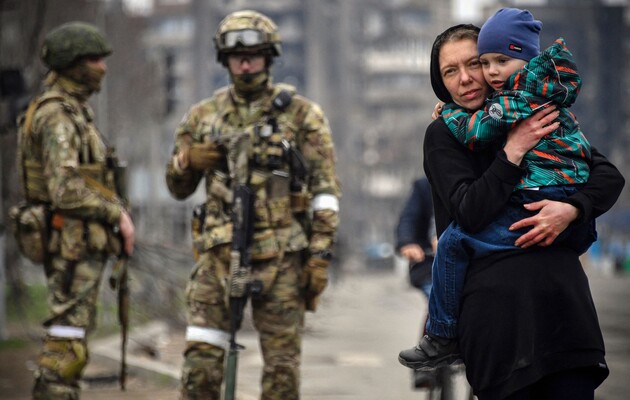OCCUPIED. How Ukrainians Pass Through Filtration Camps

article by Olexsander Neberykut, an analyst of the Civil Network "OPORA"
and Oleksandr Klіuzhev, an analyst of the Civil Network "OPORA", coordinator of the Ukrainian Nationwide campaign "The Publicity Index measuring local governance"
The ongoing missile strikes of Putin's troops and the combat updates push to the back burner the sad fact that hundreds of thousands of Ukrainians are undergoing the humiliating and extremely dangerous procedure of “filtration.” Russia's “special operation” started from the words of the kremlin's chief about “Ukrainian people taken hostage by a gang of drug-addicts and Nazis.” However, quite predictably, it turned into the persecutions of Ukrainian citizens who got caught in the territories captured by the occupiers.
When before the invasion, on February, 22, Western intelligence services warned about Russian plans to create filtration camps, many took these messages as putting it on thick. However, the reality turned out more scary than the warnings.
How and Where Does It Happen?
Virtually all residents of the temporarily occupied territories were forced to undergo a thorough inspection of russian law enforcement and collaborators. Despite the blatant violation of international law, the russians, without hiding it, deployed a multi-level system of filtering citizens of Ukraine at checkpoints, border crossing points, in filtration camps, prisons and at the place of residence, in the occupied territories and in russia itself.
The process of "screening" people is accompanied by interrogations, beatings, undressing, bullying, abductions, and disappearances. And there are murders. Former ATO participants and pensioners, children and activists, patriots and people who have preserved their piety for russia — all of them became objects of inspection. No one in the temporarily occupied territories (TOTs) could avoid the scathing attention. The occupiers target also those citizens who have no ties to the Armed Forces of Ukraine and the territorial defense. At the level of international organizations, it is already officially recognized that russians are looking not only for people associated with the military sphere. They "fish for" all those who considered themselves citizens and patriots of their own country. You dress your child in an embroidered shirt to wear in school — welcome to hell.
Indiscriminate "denazification" by the Russian Federation usually covers residents of Russian-speaking cities. This fact does not matter to us since Ukraine has long known the real motives of Russia's crimes. But this circumstance would theoretically have a lot to explain about Putin's policy to a stupefied Russian society. In the meantime, as we can see, they keep being happy with the poison about the "Ukrainian Nazis".
Citizens who try to escape to the territory controlled by Ukraine are subject to particularly harsh filtration. For many of our compatriots, the hometowns captured by the occupiers have become a real trap. According to Petro Andryushchenko, advisor of Mariupol city mayor, filtration in the city was the most brutal, when there was still a possibility of evacuation to the free part of Ukraine.
In her address to the UN Human Rights Council, the UN High Commissioner, Michelle Bachelet, informed about no free entry or exit to and from Mariupol, and listed key manifestations of "denazification" in the process of filtration. It is accompanied by arbitrary decisions, intimidation and humiliation that can be labelled as ill-treatment. Cases of separation of families and violation of the inviolability of private life have been recorded. The High Commissioner is concerned about the risks of detention and ill-treatment of those who fail to pass the filtration. "Men disappeared after being sent to "filtration camps" — these dry facts mentioned in one of the UN comments are hiding the tragedies of Ukrainian families and unforgivable crimes.
In a large "package" of abuses against Ukrainians, human rights lawyers, both European and Russian ones, recorded sexual harassment and threats of sexual violence. Unfortunately, Putin's regime is deliberately attacking Ukrainian children. In addition to the "passportization" and relocation of children to Russia, the abduction of orphans and the forced teaching of the Russian language in "educational" camps, children were taken from detained parents or settled together with adults in terrible filtration camps.
Donetsk and Luhansk lands are the focus of public attention, but the occupier applies the same practices in Zaporizhzhya, Kharkiv, and Kherson oblasts. People are sent through filtration everywhere, their fingerprints are taken. By forbidding to leave for the territory controlled by Ukraine, the occupiers force citizens to flee from the area of hostilities to Russia. In fact, people are risking filtration before leaving the dangerous territory, deportation to Russia and the prospect of becoming a target of the FSB when on the territory of the aggressor state. Deportation scourges with filtration.
"The most terrible problem is the disappearance of people while crossing the border" — this phrase of a local human rights activist, Svitlana Hannushkina, caused a stir even in the Russian media. "All this is justified, if needed, they will have to undress," the FSB representative responded to the report of abuse of Ukrainians. They always have it all justified. They "protect" Donbas by its complete destruction, the "liberate" Ukrainians in camps and prisons, they "denazify" Ukraine with rascist practices.
As expected from the occupiers, they issue Ausweis papers to victims of "filtration" to move around camps, within occupied territories, or to travel outside the captured communities. Special prisons have been prepared for those who failed to pass the inspection of the FSB and occupation administrations. According to the estimates of the Prosecutor General of Ukraine, Iryna Venediktova, in Donetsk and Luhansk oblasts alone, there are 200 permanent and temporary places of illegal detention of prisoners of war and civilians, including journalists and volunteers. In these prisons, where any "filtered" person could end up, most citizens have been subjected to torture and inhuman treatment. The Office of the UN High Commissioner for Human Rights has data on the detention of people who have not undergone filtration, in Olenivka and Donetsk, in particular in the ominous "Isolation" prison.The number of citizens who did not survive the Russian check is not known for sure, and, unfortunately, it is unlikely to be established someday.
Why do they need filtration?
The building of an extensive, multilevel and massive system of "filtration" of the civilian population makes you wonder: why does Russia need it? Until the full-scale invasion in February 2022, the occupier used filtration practices in certain areas of the Donetsk and Luhansk regions, but their scale was not so large. At that time, citizens still had the opportunity to move relatively safely between the TOTs and the free territories of Ukraine. Now, the possibility is no longer available.
Why did the occupier intensify its repressive practices? On the one hand, the answer is obvious. At the expense of civilians, Russia has planned to increase the "exchange fund", presenting activists, local government officials, and ordinary citizens as saboteurs, agents of Ukrainian special services, and resistance fighters. The practice of "inflating" the list for exchange at the cost of civilians has already become a signature of Russians, which they are increasingly using. Stanislav Miroshnychenko, a journalist of the Media Initiative for Human Rights and a researcher of Russian filtration, notes that it is not important for Russians whether they deal with a civilian or a member of the military. They call everyone military just to include them into the exchange fund. There were cases when they grabbed civilians, dressed them in military uniforms and imitated their belonging to military formations.
The invasion of areas that Russia had been planning to “defend” since 2014 has shown that the occupiers themselves are afraid of having to defend themselves against the “liberated” population. As soon as the occupiers came, for example, to Kharkiv region, they immediately reported the introduction of filtration measures and directly announced their objective: to prevent local people from helping the Armed Forces of Ukraine.
Occupying regimes in the newly captured Ukrainian territories have their feet of clay, supported by the barbaric sifting of all potential threats. In order to challenge the marginal occupation regimes, it is not necessary to be an underground resistance fighter or transfer data to Ukrainian authorities. As the recurrent fits of hysteria of local collaborators attest, the regime begins to get nervous when people simply refuse to teach their children under Russian curricula or continue to work in legitimate utility provider companies, rather in the fictitious enterprises invented by the occupiers. The lack of support for the invasion from the local population and the catastrophic shortage of personnel for the occupation administrations are compensated by a repressive filtration system and the creation of an atmosphere of total fear. In addition to identifying "violent" and potential "revolutionaries", Russia fears the emergence of a real underground resistance movement in the future and tries to be proactive in this regard.
With the help of "filtration" and the ban on leaving freely for the Ukraine-controlled territories, Russians are trying to simultaneously sever all ties between Ukrainian fellow citizens. What the occupiers in TOTs reached in years, the Russian aggressor implemented in a matter of weeks. Targeting of civilians and haste in erecting walls between the free and occupied territories testify to the weakness of Russia's position. However, unfortunately, the statement of uncertainty and inferiority complexes of the aggressor does not make it easier for people. They are the first-hand target under the rink of repressions, intimidation and humiliating inspections, with all the worst consequences.
Filtration camps and measures also have a commercial dimension. The introduction of total inspection of Ukrainian citizens has become a stable source of income and gain for the occupation administrations and military units of the aggressor. The worldwide interest of the aggressor for washing machines was also revealed during filtration measures. Shaking the money from citizens for passing the check became the same routine as beating or undressing. In Rubizhne, Luhansk region, for example, it was possible to bribe yourself free from the sadists for $100. But, as the locals say, the opportunity to negotiate on a monetary basis was a lifeline for many. The above-mentioned Petro Andryushchenko believes that people should look for contacts that help to pass the filtration without pain. "Now, there are already ways to pass it safely, which is not a big secret in the cities where it is done. Therefore, it is necessary to look for this source and go this way", — advises the Mariupol city mayor's adviser to civilians.
Putinites would not feel like themselves if they did not use their own crimes for propaganda. Having run millions of citizens of Ukraine through terrible filtration, they urge them not to go to free territories, referring to the... threats of filtration. The experiment of creating the new normal in the minds of people is aimed at making them give up and not dream of returning to a safe life. The Russians actively monitor the statements of Ukrainian officials about security measures and falsely present them to the population as evidence that Ukraine is resorting to similar actions. Cynical Russian disinformation of intimidated citizens needs information counteraction from the Ukrainian state.
What are the primary expectations of Russians from the "filtration of civilians"?
The "multitasking" of the Russian system of "filtration" of civilians should not obscure the primary goal of Russians. By humiliating checks of citizens, they introduce their ideology. The ideology of the destruction of the right to the existence of all Ukrainian. The Ukrainian hatred approach is best evidenced by the words of those who passed the "filtration" itself.
“..."The questions went about the attitudes to the Ukrainian language, how intensely I speak it, whether I was happy that people in the Donbass were forced to speak Ukrainian… They liberate us from Ukraine,” — shared a citizen from Rubizhne, Yuliya Pustovit. Thus, according to Russian Nazis, you can only successfully pass the filtration if you reject your birth country, your language, your patriotic feelings, and in fact, when you reject all of your life.
As combined with the humanitarian policy in the TOTs, Russia overtly demonstrates their position: Ukrainians do not have the right to exist. "Sadistic atrocities and a focused process of"filtration" may well have a purpose. Especially if this purpose is to deny the very concept of Ukrainian statehood in the areas that the Russian Federation now controls, in order to more easily absorb these parts of Ukraine, "U.S. Ambassador to the OSCE, Michael Carpenter, aptly described Russia's policy back in May. This circumstance of the Russian "special operation" should always be remembered by those who want peace with Russia at the expense of territorial concessions of Ukraine.
Has the World Noticed the Tragedy of “Filtration” of Ukrainian People?
Yes and no. World media and politicians talk about the criminal practices of Russians, but most of them say that it is impossible to influence the situation. Crime has already become commonplace. There is a threat that they will be perceived as the inevitable consequences of war. It is important to continue to look for options to save people. International organizations should be more persistent to demand access to the occupied territories and expelling the occupying state from respectable international institutions, where they have no right to stay after all the crimes they committed.
“OSCE needs to make a choice: either to allow the RF to undermine the organization, or to find the way to stop their power,” Ukrainian Foreign Minister Dmytro Kuleba recently addressed the OSCE Annual Security Conference with these words. Law enforcement agencies of Ukraine should demonstrate high standards of documentation and investigation of crimes against citizens committed during the occupiers' "filtration". To this end, it is necessary to create a real system for collecting testimonies of citizens, both within the country and among Ukrainian refugees. Officials should remove bureaucratic obstacles, as soon as possible, to the return of Ukrainians from Russia. The key is not to take crimes as part of a commonplace routine.
Read this article by Olexsander Neberykut and Oleksandr Kliuzhev in russian and Ukrainian.
Please select it with the mouse and press Ctrl+Enter or Submit a bug













.jpg)
(4).jpg)
 Login with Google
Login with Google